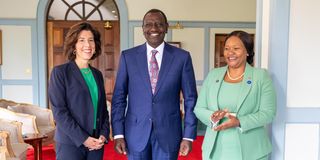
From left: The US Secretary of Commerce Gina Raimondo, President William Ruto and Trade CS Rebecca Miano during the American Chamber of Commerce (AmCham) Business Summit in Nairobi.
I had been invited by the handlers and advisers of the cabinet secretary for Investments, Trade and Industry, Rebecca Miano, to a discussion on the merits and significance of an initiative she recently unveiled under the brand name Karibu Business Support Centres.
We, journalists, value one-on-one conversations and engagement with CSs and other top policy-makers because you get a first-hand opportunity to gauge whether they possess deep domain knowledge on the pressing and burning issues around the sector they are in charge of. You also have a window and front row seat to weigh and form an opinion on whether you are able to observe and judge if the minister has a single-minded focus on driving outcomes.
Ms Miano joined the Cabinet with glowing credentials, having successfully stewarded Ken Gen—the Sh51 billion balance sheet company with a workforce numbering 1,500 employees and is the largest electricity company in the region—for nearly six years. Yet in such a short stint as CEO, she delivered multi-billion-shilling green energy projects, mainly at the Olkaria geothermal hub. But perhaps her biggest achievement was having expanded the scope of the company into commercial geothermal drilling. That effort at broadening and diversifying revenue streams saw her implement large geothermal drilling projects in neighbouring countries, including Ethiopia and Djibouti.
Appease shareholders
As the CEO of a large listed company, you have to constantly appease shareholders and satisfy NSE’s insatiable hunger for short-term results. The pressure for immediate measurable results is very high, and you find yourself absorbed with quarterly earnings and product launches.
When I met Miano last week, the first thing I wanted to ask her was her views on the recently published opinion polls that gave her very low marks in terms of performance as a, CS. Had her new appointment abruptly thrust her into unfamiliar territory, where she was finding difficulty in trying to repeat the success she had achieved in the corporate boardroom?
Her response was cryptic: “Opinion polls are useful checks on claims we, people in policy-making, tout as having achieved. But I wish they could be giving marks on performance that can be quantified.”
I asked her: What is the Karibu Business Centre? What does it offer that the existing programmes don’t? Considering that all government agencies which support enterprise development provide support services to entrepreneurs, doesn’t this amount to duplication? She, however, explained that her ministry is correcting an unco-ordinated flow of information from government departments and agencies to budding investors.
One-stop place
“This is a one-stop place to help investors to navigate the complex web of business regulations and procedures that are required to set up shop in Kenya. You walk into the centre and you get all the information you need.”
But where has this experiment worked? I made a mental note that, although they are slow to admit it, it is more or less a copy-and-paste of the famous Tokyo One Stop Business Establishment Centre (Tosbec), which provides a single point of contact for all business registration and licensing needs to both local and foreign investors. Tosbec is credited with making Japan one of the most attractive countries in terms of ease of doing business. Still, whether what has worked in Tokyo will work here remains an open-ended question.
Broader issues
Back to our debate and discussions on the broader issues. What strikes you as you debate with the minister is her extraordinary grasp of the contemporary issues in her docket. We debated the opportunities that have recently opened up for Kenya by economic partnership agreements with parties like the European Union and the UK and under the African Free Trade Agreement (AfFTA).
Miano’s regret was that Kenya did not take full advantage of the expired Agoa trade deal with the US. She opined that one of the challenges she has to grapple with in the medium term was to urgently introduce measures that will ensure the new Agoa programme with Kenya will deliver preferential market access to markets in the US beyond textile and apparel.
She argued that, despite the fact that the expired Agoa gave us preferential access to almost 6,500 items, we hardly went beyond textiles and apparel. On manufacturing, she lamented the fact that the sector’s contribution to GDP had plummeted to single-digit figures. That her challenge in the medium term will be to introduce tangible and measurable steps to restore the manufacturing sector’s contribution to national income back to double digits.
Will Ms Miano manage to successfully introduce the boardroom culture of quick and measurable results in delivering the ambitious targets for the sector and docket? The jury is still out. However, my take is that her corporate background and the mindset about performance that can be quantified has not died. She has sharply defined and carefully limited the things she wants to achieve. Let’s wait and see.










